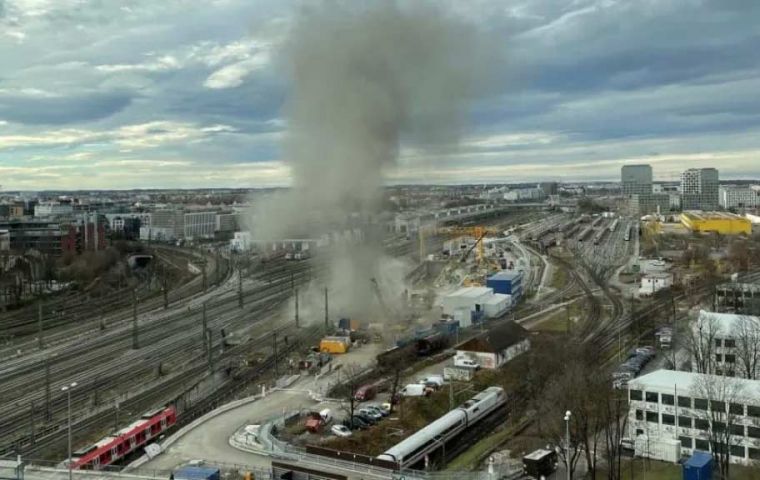MercoPress. South Atlantic News Agency
WWII bomb goes off in Munich during railroad works
 Germany has been dubbed a graveyard of bombs and explosives (Pic @RCR750)
Germany has been dubbed a graveyard of bombs and explosives (Pic @RCR750) Four people were injured in Germany when a dormant World War II bomb went off Wednesday after 12 noon local time near the Donnersberger Bridge, not far from Munich's central train station.
The explosion of a World War II bomb unearthed during construction works took place on the railroad tracks and could be heard from several kilometers away. One of the injured is seriously ill, it was reported.
Bavarian Interior Minister Joachim Hermann confirmed the bomb dated from the WWII. “Debris flew several hundred meters away. The entire area is currently being canvassed,” Hermann added.
Rail traffic was interrupted by the explosion and security forces cordoned off the area, according to the Munich Police's Twitter account.
According to press reports, smoke rose from the Donnersbergerbruecke station, where a new commuter train line was under construction. Authorities are investigating how this bomb fell through the cracks.
According to a Reuters report, Germany was dubbed “a graveyard of unexploded bombs and ammunition.” Officials find more than 2,000 tons annually. Allied forces hit Germany with 1.5 million tons of explosives and killed 600,000 people during the war. German officials estimate that 15 percent of those World War II bombs did not explode. Many dropped bombs burrowed into the ground as deep as 20 feet deep.
Police said that this particular Munich site involved tunnel construction in the area. Railroad official suspended all inbound and outbound services after the blast, but it was resumed later in the afternoon.
Although most World War II bombs are disposed of in controlled settings, these type of events are becoming more frequent. Ahlbach residents in southern Germany felt a morning blast in July of 2019 that caused a 33-foot wide hole in a cornfield. Officials said a World War II bomb was the cause was likely the 13-foot deep hole. That same year, a 3,000-pound bomb caused the evacuation of 60,0000 Frankfurt residents.
In 2010, three police experts in Goettingen died as they prepared to defuse a 1,000-pound bomb. Four years later, a construction worker’s power shovel struck a 4,000-pound bomb in Euskirchen. That explosion drew comparisons to a 1994 explosion where three construction workers died in Berlin.
Another 2012 Munich blast caused damage to 17 buildings when officials tried to detonate a 500-pound World War II bomb. Three years later, Offenbach officials had to figure out how to fix a 10-foot hole in a road after a 1,000-pound bomb exploded.
Operations to defuse “dormant bombs” dropped by the Allies are relatively frequent in Germany and have sometimes resulted in massive evacuations of residents. In 2016 in the city of Augsburg, when 54,000 residents were temporarily forced off their homes to defuse a British explosive




Top Comments
Disclaimer & comment rulesCommenting for this story is now closed.
If you have a Facebook account, become a fan and comment on our Facebook Page!